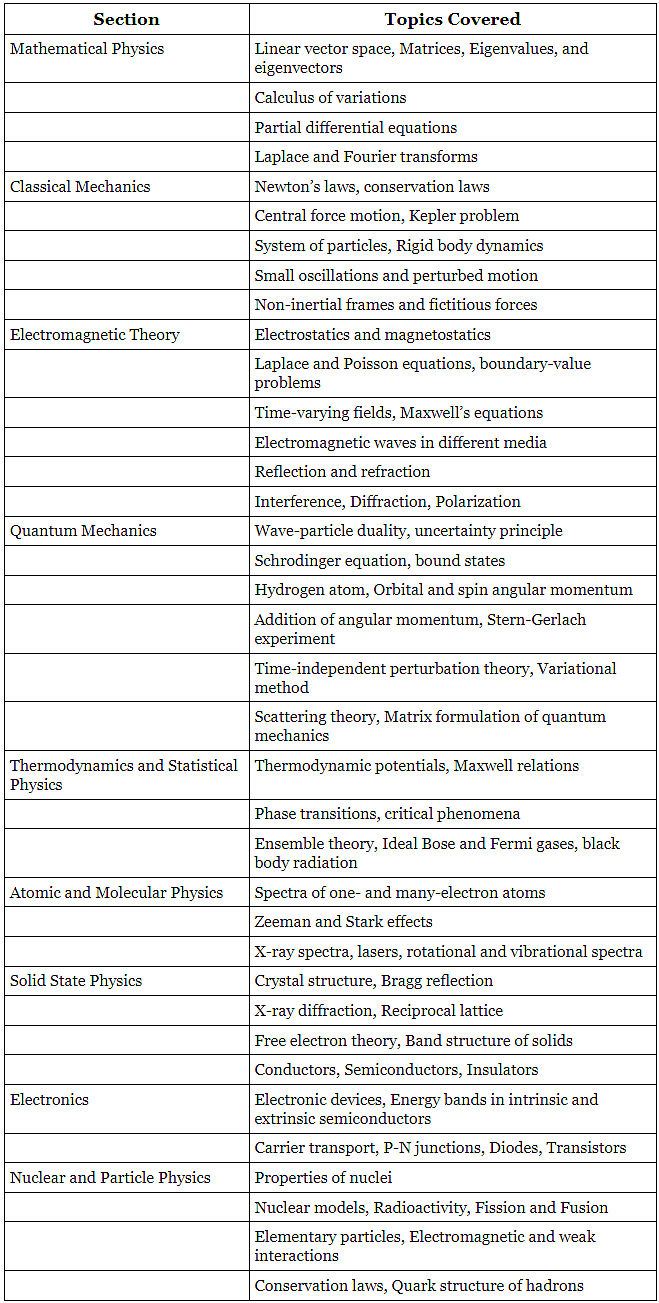GATE Physics Syllabus 2024 PDF Download
GATE 2024 Physics Syllabus
The GATE 2024 Physics Syllabus consists of nine sections and covers various topics such as Mathematical Physics, Classical Mechanics, Electromagnetic Theory, Quantum Mechanics, Thermodynamics and Statistical Physics, Atomic and Molecular Physics, Solid State Physics, Electronics, Nuclear and Particle Physics. By referring to the syllabus, candidates can plan their studies effectively. Additionally, the web page below provides detailed information about the topics covered in the syllabus.Find the details of the syllabus from the table below.

GATE Physics Syllabus Exam Pattern 2024
In addition, it is recommended that candidates refer to the GATE Physics Marking Scheme and other reference materials to prepare more efficiently for the GATE Exams 2024. The exam pattern details are provided below:- General Aptitude (GA) Marks = 15 Marks
- Physics (PH) Subject Marks = 85 Marks
- Total Marks for PH = 100 Marks
- Total Time (in Minutes) = 180 Minutes
Frequently Asked Questions on GATE Physics Syllabus 2024
How can we access the GATE Physics Syllabus 2024?
The latest GATE Physics Syllabus 2024 is usually released on the official GATE website by IIT. Additionally, we provide the PDF format on our page and details of the topics on the respective webpage.
How many sections does the GATE 2024 Syllabus for Physics have?
The GATE 2024 Syllabus for Physics has nine sections, covering various topics such as Mathematical Physics, Classical Mechanics, Electromagnetic Theory, Quantum Mechanics, Thermodynamics and Statistical Physics, Atomic and Molecular Physics, Solid State Physics, Electronics, and Nuclear and Particle Physics.
What are the key concepts covered under Section-6: Atomic and Molecular Physics of the Syllabus?
Section-6 of the Syllabus covers topics such as the spectra of one- and many-electron atoms, spin-orbit interaction with LS and jj couplings, fine and hyperfine structures, Zeeman and Stark effects, electric dipole transitions and selection rules, rotational and vibrational spectra of diatomic molecules, electronic transitions in diatomic molecules, the Franck-Condon principle, Raman effect, EPR, NMR, ESR, X-ray spectra, and lasers, including Einstein coefficients, population inversion, and two and three level systems.
Where can I access the GATE Physics Syllabus 2024?
The latest GATE Physics Syllabus 2024 is usually released on the official GATE website. It can be accessed there or downloaded in PDF format. Some other educational websites may also provide the syllabus.
FAQs on GATE Physics Syllabus 2024
| 1. What is the syllabus for GATE Physics 2024? |  |
| 2. Is there a specific exam pattern for GATE Physics 2024? |  |
| 3. Can you provide more details about the topics covered in the GATE Physics syllabus? |  |
| 4. How should I prepare for the GATE Physics exam based on the syllabus? |  |
| 5. Is there any negative marking in the GATE Physics exam? |  |



















